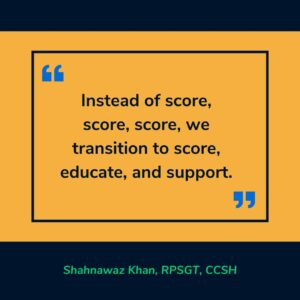EnsoSleep simplifies sleep scoring, empowering technologists to focus on other areas of the patient care continuum
In part one of our 4-part series on how EnsoSleep impacts the roles of sleep professionals, we demonstrate how AI scoring technology supports the day-to-day activities of sleep technologists by reducing the time spent scoring studies, on average, by over 62% per PSG and 68% per HSAT, (according to data collected from EnsoData customers).
The Evolving Role of Sleep Technologists in the Sleep Lab
While everyone in the sleep lab benefits from the impact of EnsoSleep AI Scoring, Registered Polysomnographic Technologists (RPSGTs) who actively score HSAT and PSG studies are the sleep team members whose roles are most impacted by scoring technology on a daily basis.
Techs are often responsible for supporting in-lab patients in nearly every aspect of the sleep study process: setting up patients for sleep studies, monitoring brain waves and respiratory breathing, titrating patients, which may require on-the-fly scoring for split patients, and also scoring the sleep data. Many techs also make calls to patients to reduce no-shows, support remote patient monitoring, and provide general patient education.
Since EnsoSleep scores the studies from scratch, and an RPSGT only needs to review the scoring and make minor edits, techs save on average 31 minutes per PSG and more than 20 minutes per HSAT compared to scoring from scratch. This saved time can be repurposed for other activities, including patient education, referral generation and follow-up, marketing outreach, accreditation, covering staff outages, and more.
For techs that love scoring, EnsoSleep can improve efficiency by providing time to score more studies, reach more patients, grow testing volumes, or cut into scoring and testing backlogs.
Empowering Sleep Technologists to Expand Patient Care
For many sleep professionals, roles are evolving rapidly as technology changes. Technologists are providing impactful patient care, solving sleep challenges, and helping patients get back to healthy lives, which is why many got into the field of sleep medicine in the first place. By allowing EnsoSleep to take the first pass at scoring PSG and HSAT studies, not only do techs have more time to work with patients, but also time and opportunity to advance their career, which can have massive benefits for the sleep organization as a whole.
For example, the CCSH credential can open up doors for techs to expand their role in the sleep lab. The CCSH equips team members with the knowledge and skills to add a Sleep Navigation or Sleep Education program in the clinic. These programs provide staff with the tools to better serve the increasingly complex patients seen in the lab.
EnsoSleep’s Role in Generating Positive Patient Outcomes
While many autoscoring solutions have caused techs to spend time fixing countless imperfections in the scoring, EnsoSleep is sleep study scoring automation that actually works.
With over 93% overall diagnostic agreement on the Apnea-Hypopnea Index (AHI) for adult patients, the changes a technologist needs to make on an EnsoSleep scored study often do not result in a change to a patient’s AHI severity group.
“Because the end-goal is identifying the proper treatment pathway and clinical diagnosis, technologists can worry less about the exact length of apneic events and focus more on the clinical diagnosis. By not having to continuously click though cyclical events, techs are empowered to focus more on the quality of care and service towards patients and PAP adherence and compliance,” said Shahnawaz Khan, RPSGT, CCSH.
 Khan, who started as a night tech and worked for a decade in different sleep lab roles, now works as a clinical informaticist with EnsoData. In his role, he helps transition technologists from manual scoring.
Khan, who started as a night tech and worked for a decade in different sleep lab roles, now works as a clinical informaticist with EnsoData. In his role, he helps transition technologists from manual scoring.
“One of the areas of pushback is in the minutia of the scoring. Techs can be very particular about how they score arousals, PLMS, and apneas. I help them shift their mindset from spending too much time overanalyzing and critiquing, to understanding the physiology and overall picture in a sleep study. Instead of score, score, score, we transition to score, educate, and support,” concluded Khan.
Ultimately, EnsoSleep gives technologists the ability to more positively impact patient lives and their sleep health by reducing the time spent scoring each individual study and increasing the capacity to spend more time with your patients.
To read how EnsoSleep impacts the other roles in the sleep lab, stay tuned for these upcoming blogs:
- Lab Managers Leverage EnsoSleep to Support their Team
- EnsoSleep AI Scoring Empowers Physicians
- EnsoSleep AI Scoring Provides ROI for Owners, Directors, and Administrators
To learn more, request an EnsoSleep Demo with our team.






